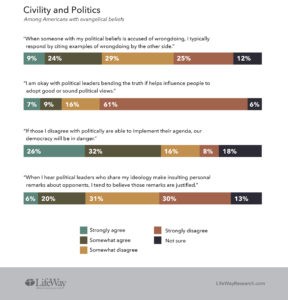Read a newspaper, put down the smart phone and get to know your neighbors. These are among suggested remedies for a “caustic, toxic, ignorant and corrosive” American public square in a study released last week by the public policy arm of the Southern Baptist Convention.
“We hate our politicians, and we hate each other,” says a 72-page report on the lack of civility in public life produced by the SBC Ethics & Religious Liberty Commission.
 The Faith and Healthy Democracy report, written by lead researcher and Georgetown University professor Paul D. Miller, is based on interviews with experts and religious leaders and an online survey of 1,317 evangelicals by LifeWay Research, a division of the denomination’s publishing arm.
The Faith and Healthy Democracy report, written by lead researcher and Georgetown University professor Paul D. Miller, is based on interviews with experts and religious leaders and an online survey of 1,317 evangelicals by LifeWay Research, a division of the denomination’s publishing arm.
More than one-fifth of respondents to the public opinion poll said they believe civility in political conversations is not productive. A quarter said that if a political leader they supported insulted an opponent, they would be inclined to believe such insults were justified.
A third admitted to engaging in “whataboutism,” defined by the study as “responding to a critique by citing examples of wrongdoing on the other side.” More than half said democracy would be in danger if their political opponents were able to implement their agenda.
“Evangelicals even appear to be comfortable with their news bubbles,” the study said. “Over half said they trusted news more if delivered by someone with similar views on social and political issues.”
According to LifeWay Research, 74 percent of evangelicals primarily get their news from television, compared to 27 percent who rely on print newspapers or magazines. Nearly half of those getting their news from television most often watch it on Fox News. Four in 10 get their news from websites and/or social media.
The report said while good at entertainment and superficial connection with friends, TV and social media “are very bad” at keeping the public informed about current events.
“Avoid TV news and talk shows, subscribe to a newspaper or news magazine, and do not debate politics over Facebook or Twitter,” the report advises. “Do not use late-night comedy or YouTube shows as your primary sources of news.”
“Print media do not avoid bias, but they do engage our minds more actively, helping us to assess and filter out bias,” the study says. “Text is also less emotional and less sensational than the image-based media of TV and most social media. Debate politics with passion, but do so face-to-face with your friends, colleagues and neighbors, not over the Internet.”
More than half of evangelicals polled by LifeWay said the teachings of their local church have influenced their political views, while 70 percent said they do not regularly participate in another organization outside of church such as a neighborhood association, PTA, neighborhood watch or non-profit service organization like a rescue mission, Lions Club or VFW.
The ERLC recommended that individuals and families put down their smart phones, don’t give them to their kids, teach children to mind their manners in public and get involved in community activities like a hobby club, a sports team or inviting someone to dinner once a month. Seek out friends of a different race, political party or economic and educational background than your own and “try not to have opinions about everything.”
“We are blessed to live in a country where we can believe and say anything,” the study said. “That doesn’t mean we should. Nor does it mean that whatever we say or believe has automatic validity. Learn and study before forming an opinion; if someone disagrees, ask why and listen. Do not rush to ascribe malice, foolishness or stupidity to someone just because they disagree with you.”
